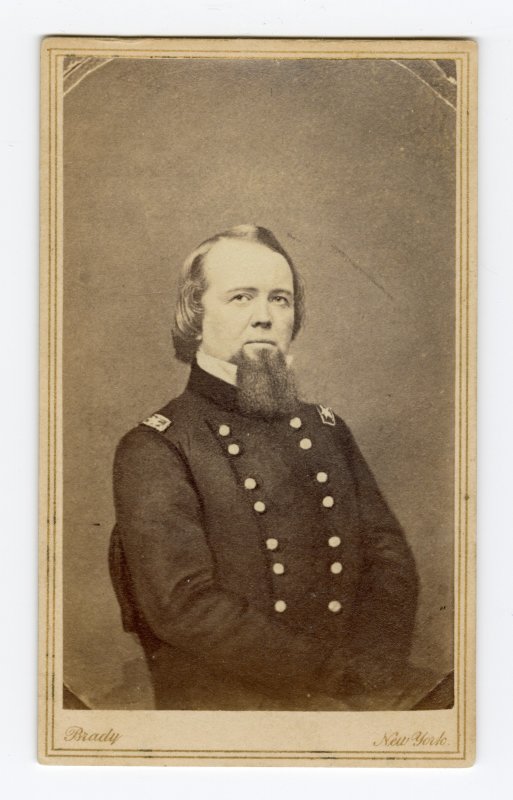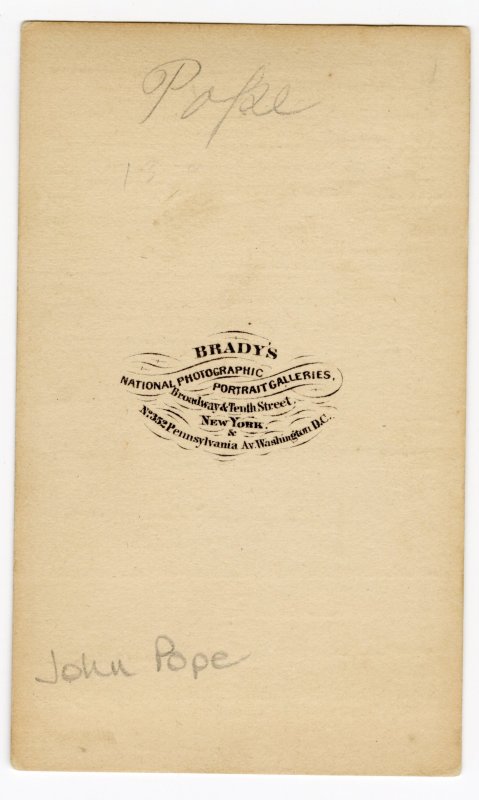General John Pope
Item CDV-10400
Price: $185.00
Description
Pope was serving on lighthouse duty when Abraham Lincoln was elected and he was one of four officers selected to escort the president-elect to Washington, D.C. He offered to serve Lincoln as an aide, but on June 14, 1861, he was appointed brigadier general of volunteers (date of rank effective May 17, 1861) and was ordered to Illinois to recruit volunteers.In the Department of the West under Maj. Gen. John C. Frémont, Pope assumed command of the District of North and Central Missouri in July, with operational control along a portion of the Mississippi River. He had an uncomfortable relationship with Frémont and politicked behind the scenes to get him removed from command. Frémont was convinced that Pope had treacherous intentions toward him, demonstrated by his lack of action in following Frémont's offensive plans in Missouri. Historian Allan Nevins wrote, "Actually, incompetence and timidity offer a better explanation of Pope than treachery, though he certainly showed an insubordinate spirit."
Pope eventually forced the Confederates under Sterling Price to retreat southward, taking 1,200 prisoners in a minor action at Blackwater, Missouri, on December 18. Pope, who established a reputation as a braggart early in the war, was able to generate significant press interest in his minor victory, which brought him to the attention of Frémont's replacement, Maj. Gen. Henry W. Halleck.
Halleck appointed Pope to command the Army of the Mississippi (and the District of the Mississippi, Department of the Missouri) on February 23, 1862.[2]Given 25,000 men, he was ordered to clear Confederate obstacles on the Mississippi River. He made a surprise march on New Madrid, Missouri, and captured it on March 14. He then orchestrated a campaign to capture Island No. 10, a strongly fortified post garrisoned by 12,000 men and 58 guns. Pope's engineers cut a channel that allowed him to bypass the island. Assisted by the gunboats of Captain Andrew H. Foote, he landed his men on the opposite shore, which isolated the defenders. The island garrison surrendered on April 7, 1862, freeing Union navigation of the Mississippi as far south as Memphis.
Pope's outstanding performance on the Mississippi earned him a promotion to major general, dated as of March 21, 1862. During the Siege of Corinth, he commanded the left wing of Halleck's army, but he was soon summoned to the East by Lincoln. After the collapse of Maj. Gen. George B. McClellan's Peninsula Campaign, Pope was appointed to command the Army of Virginia, assembled from scattered forces in the Shenandoah Valley and Northern Virginia. This promotion infuriated Frémont, who resigned his commission.
Pope brought an attitude of self-assurance that was offensive to the eastern soldiers under his command. He issued an astonishing message to his new army on July 14, 1862, that included the following: Let us understand each other. I have come to you from the West, where we have always seen the backs of our enemies; from an army whose business it has been to seek the adversary and to beat him when he was found; whose policy has been attack and not defense. In but one instance has the enemy been able to place our Western armies in defensive attitude. I presume that I have been called here to pursue the same system and to lead you against the enemy. It is my purpose to do so, and that speedily. I am sure you long for an opportunity to win the distinction you are capable of achieving. That opportunity I shall endeavor to give you. Meantime I desire you to dismiss from your minds certain phrases, which I am sorry to find so much in vogue amongst you. I hear constantly of "taking strong positions and holding them," of "lines of retreat," and of "bases of supplies." Let us discard such ideas. The strongest position a soldier should desire to occupy is one from which he can most easily advance against the enemy. Let us study the probable lines of retreat of our opponents, and leave our own to take care of themselves. Let us look before us, and not behind. Success and glory are in the advance, disaster and shame lurk in the rear. Let us act on this understanding, and it is safe to predict that your banners shall be inscribed with many a glorious deed and that your names will be dear to your countrymen forever
— John Pope, message to the Army of Virginia
Despite this bravado, and despite receiving units from McClellan's Army of the Potomac that swelled the Army of Virginia to 70,000 men, Pope's aggressiveness exceeded his strategic capabilities, particularly since he was now facing Confederate General Robert E. Lee. Lee, sensing that Pope was indecisive, split his smaller (55,000-man) army, sending Maj. Gen. Thomas J. "Stonewall" Jackson with 24,000 men as a diversion to Cedar Mountain, where Jackson defeated Pope's subordinate, Nathaniel Banks.
As Lee advanced on Pope with the remainder of his army, Jackson swung around to the north and captured Pope's main supply base at Manassas Station. Confused and unable to locate the main Confederate force, Pope walked into a trap in the Second Battle of Bull Run. His men withstood a combined attack by Jackson and Lee on August 29, 1862, but on the following day, reluctantly obeying Pope's orders, Maj. Gen. Fitz John Porter swung to attack Jackson, exposing his (and by extension the whole Union army's) flank. Maj. Gen. James Longstreet launched a surprise flanking attack, and the Union Army was soundly defeated and forced to retreat. Pope compounded his unpopularity with the Army by blaming his defeat on disobedience by Maj. Gen. Porter, who was found guilty by court-martial and disgraced.
Brigadier General Alpheus S. Williams, who served briefly under Pope, held the general in particularly low esteem. In a letter to his daughter, he wrote: “All this is the sequence of Gen. Pope's high sounding manifestoes. His pompous orders ... greatly disgusted his army from the first. When a general boasts that he will look only on the backs of his enemies, that he takes no care for lines of retreat or bases of supplies; when, in short, from a snug hotel in Washington he issues after-dinner orders to gratify public taste and his own self-esteem, anyone may confidently look for results such as have followed the bungling management of his last campaign ... I dare not trust myself to speak of this commander as I feel and believe. Suffice it to say (for your eye alone) that more insolence, superciliousness, ignorance, and pretentiousness were never combined in one man. It can with truth be said of him that he had not a friend in his command from the smallest drummer boy to the highest general officer. All hated him." Defeat of Pope's army in the Second Battle of Bull Run, by Alfred Waud
Pope himself was relieved of command on September 12, 1862, and his army was merged into the Army of the Potomac under McClellan. He spent the remainder of the war in the Department of the Northwest in Minnesota, dealing with the Dakota War of 1862. His months campaigning in the West paid career dividends because he was assigned to command the Military Division of the Missouri on January 30, 1865, and received a brevet promotion to major general in the regular army on March 13, 1865, for his service at Island No. 10.
Source: Wikipedia


